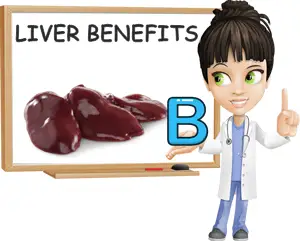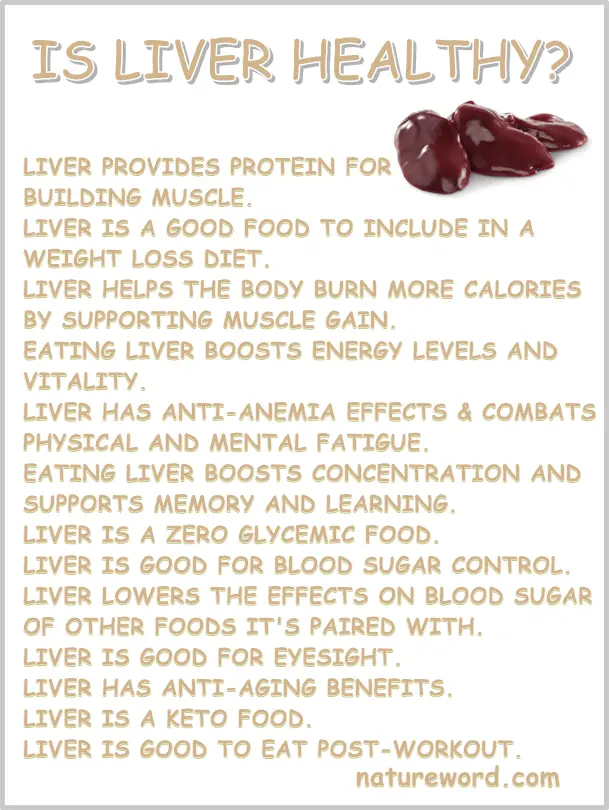Liver is healthy, but not devoid of side effects. Liver is one of the healthiest foods you can eat in the sense that it packs a nutritional value few other foods do with many benefits for health deriving from it. At the same time, it’s quite heavy on the stomach which means it’s not the best of foods to eat for acid reflux disease. As a high protein food, it’s also contraindicated in kidney disease.
Read on to find out what makes liver healthy and what makes it not so good for you.
What are the benefits of eating liver?
Nutritionally dense food
Liver as food is good for preventing and correcting nutritional deficiencies due to its dense nutritional value. Liver is a particularly good to eat for its high content of B vitamins, vitamin A, protein, dietary minerals such as copper, phosphorus, selenium, iron and zinc.

Supports muscle function and helps build new muscle
Muscle health relies heavily on getting enough protein from the diet. Protein serves as raw material for the acquisition of new muscle and helps repair muscle damage. Good muscle function is dependent on eating sufficient protein. In addition to being high in protein, liver has the added benefit that it is a source of complete protein, that is, protein complete in all essential amino acids the body needs every day.
Helps you lose weight in a healthy manner
Liver has a moderate energetic value: there are only 119 kcal (kilocalories, calories) per 100 grams of chicken liver. This, and the fact that it’s packed with nutrition, make it a good food to include in a weight loss diet plan. Eating liver further supports weight loss efforts via its high protein content which helps with new muscle gain. Building muscle is good for losing weight because muscle tissue burns more calories than fat tissue.
Good food for protein-energy malnutrition
Essentially, liver is so nutritionally dense that it can serve as food to correct malnutrition. In addition to correcting vitamin and mineral deficiencies, liver helps correct what is known as protein-energy malnutrition which is a deficiency of protein and calories.

Anti-anemia action
If you have anemia, then liver is one of the best foods you can eat. Liver is naturally high in iron, vitamin B12 and vitamin B9 – deficiencies in either of these nutrients cause anemia and associated side effects, including muscle weakness, generalized weakness, tiredness and fatigue, poor concentration and poor resistance to exercise.
See how much iron and other vitamins and minerals in chicken liver.
Boosts energy levels and vitality
Liver is naturally rich in iron, vitamin B12, vitamin B6 and vitamin B9 all of which contribute to energy metabolism. Iron, vitamin B12 and B9 are needed to make red blood cells to transport oxygen to organs and tissues for elevated energy levels and a boost in vitality. Vitamin B6 helps produce hemoglobin and boosts the capacity of hemoglobin to absorb oxygen, actively helping combat physical and mental fatigue.
Provides long-lasting energy
For long-lasting energy, eat either foods high in complex carbohydrates such as whole grains, or foods high in protein such as liver. The high content of protein as well as the fat in liver are digested slowly and release energy over the course of hours, curbing hunger and providing lasting satiety. Also see what are the 13 benefits of eating liver.
Zero-glycemic food
Liver has a very low glycemic index score, some say zero. This is because liver is naturally high in protein (16.9 grams of protein per 100 grams), but almost carbohydrate-free (0.73 grams of carbs per 100 grams). Considering carbohydrates are the source of blood sugar, and liver has almost none, it stands to reason its glycemic effects are null.
Combats brain fog
Brain fog is a state of mental confusion characterized by foggy thinking or thinking that feels blurred or odd, difficulty concentrating and communicating thoughts and feelings, lack of interest and feeling distracted. Eating fat and protein contributes to clearer thinking and supports learning and memory and foods such as liver are a great option.
Protective effect against neurodegenerative diseases
A serving of 100 grams of chicken liver provides 115% of daily cholesterol values and 691% of daily vitamin B12. Both cholesterol and vitamin B12 help build the myelin sheath, a protective coating surrounding the tail of nerve cells. Loss of the myelin sheath is associated with degenerative diseases of the nervous system such as multiple sclerosis and eating foods such as liver exerts a protective effect.
Improves and maintains good eyesight
Did you know liver is good for eyesight? Liver is naturally very high in vitamin A with over 350% of daily values for the average adult. Vitamin A protects vision via antioxidant effects as helps maintain color vision, visual acuity and vision in dim light dubbed night vision.
Benefits for skin: anti-aging, reparative, regenerative
High in vitamin A, liver helps with skin cell turnover and skin cell regeneration. Vitamin A exerts reparative effects at cell level as well as an anti-aging action owed to potent free radical-scavenging activities.
Has cholesterol-lowering properties
Liver itself is a food high in cholesterol: it provides 115% of total daily cholesterol values for the average adult. At the same time, it has cholesterol lowering properties. More exactly, liver is naturally high in vitamin B3 which has scientifically proven cholesterol lowering effects.
Moreover, eating liver occasionally and in reasonable amounts will not cause high blood cholesterol levels. Cholesterol from food does not raise blood cholesterol levels directly, if said food is consumed in normal food amounts – not in large amounts and not every single day.
Good food to eat during pregnancy
Liver is a healthy food to eat during pregnancy, with benefits for both the baby and the expecting mother. Extremely high in vitamin B9, liver reduces risks of neural tube defects in babies, helping the brain, spine and spinal cord develop normally. Vitamin A in liver further contributes to the normal development of the baby. High in most B vitamins and iron, liver also boosts energy levels and vitality, helping combat pregnancy fatigue.
Liver is a keto food
Its macronutrient makeup recommends liver as a good food to eat in a keto diet. What makes liver keto is its high protein content, paired with a modest fat content, and very low content of carbohydrates. With 16.9 grams of protein and only 0.73 grams of carbs, liver counts as a keto food.
Good food to eat post-workout
Liver is actually a great food to eat after a workout because it’s both high-protein and contains high-quality protein. Post-workout, liver delivers much needed protein to help repair muscle fibers damaged during exercise and serve as raw material for new muscle acquisition. However, liver is not the best food to eat before a workout. Heavy on the stomach, if eaten pre-exercise, liver can cause acid reflux and heartburn which may compromise the workout.
Anticancer activity
Liver is naturally extremely high in vitamin A which has scientifically proven immunomodulating activities. Vitamin A is important for supporting the immune system function by scavenging free radicals and initiating reparative processes that combat oxidative damage. A deficiency of the vitamin leading to immune system depression increases risks of various cancers.
Protein in liver further provides immune system support. Protein is needed to make components of the immune system such as white blood cells which target agent of disease such as bacteria, viruses and cancer cells.
Supports the immune system function
Eating liver supports the immune system function via a high content of vitamin A, zinc and protein. Vitamin A in liver scavenges free radicals and combats and limits free radical damage to cells and DNA. It also exerts reparative effects that counteract oxidative damage conducive to disease.
Zinc and protein in liver actively support the immune system function, contributing to making white blood cells and supporting their functions. Eating liver also prevents deficiencies in vitamin A, zinc and protein which depress the immune system.
Benefits for thyroid health
Liver is a good food to eat for thyroid health. With a content of selenium of over 99% of daily values, liver supports thyroid function. A healthy thyroid is a source of benefits for energy metabolism and supports good fertility.
Contributes to good bone density
High in selenium, zinc and phosphorus, liver is a source of benefits for bones and teeth. The good amounts of the three minerals in liver help improve bone density both directly and indirectly. Phosphorus is the second most common mineral in bones and teeth – it helps build and strengthen bone tissue.
Zinc is also part of bone makeup, although to a lesser extent, while selenium regulates new bone formation via its action on the thyroid. See the 5 minerals to eat for good bone density.
Anti-aging effects
Liver is healthy, but the last food you’d consider for antiaging benefits. But liver is naturally high in copper, a dietary mineral with benefits for premature hair graying and discoloration of the iris.
Vitamin A in liver s directly involved in skin cell renewal and skin cell differentiation and exerts antioxidant and antiaging effects. Vitamin A acts as an antioxidant, scavenging free radicals, and combats associated cell damage, initiating reparative processes conducive to a healthier, more youthful skin. Vitamin B3 is effective against dermatitis, skin thickening, skin inflammation and hyperpigmentation such as age spots caused by to sun damage.
Good for blood sugar control
Liver is a healthy food that promotes blood sugar control. It’s a very low glycemic food which, when eaten on its own, has little to no effect on blood sugar. Not just this, but eating liver together with foods that are high in carbs lowers the effects on blood sugar of those other foods, helping achieve better blood sugar control.
What are the side effects of eating liver?
- Heavy food. Because of its natural makeup, liver is not light on the stomach and consumption, even in relatively reasonable amounts, may sometimes lead to indigestion, especially in those with existing digestive conditions.
- Causes acid reflux and heartburn. Because it’s a heavy food, liver can trigger symptoms in acid reflux disease (GERD), causing regurgitation of stomach juices, heartburn, nausea, indigestion and acid reflux at night that causes you to wake up from your sleep.
- Not a good food to eat for gout. Gout is a disease characterized by high levels of uric acid accumulating in the blood, leading to crystal deposits in joints and associated inflammation and pain. Liver is a food high in purines which causes high levels of uric acid and triggers gout flareups.
- Bad for kidney disease. People with kidney disease are advised to limit their intake of protein. This is because damaged kidneys have issues eliminating byproducts of protein metabolism which can result in toxicity. Talk to your doctor about how much liver you can eat if you have kidney disease.
